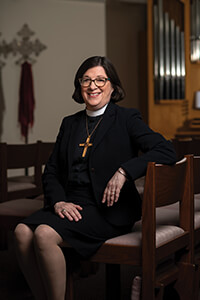Season of doubt
November 1, 2019
When serving as a parish pastor, I would sometimes be asked if it was possible to be a faithful Christian and also doubt. Could one be a disciple and also question?
Parishioners would be hesitant to ask for fear that they would face judgment—Divine and mine. Somehow, we’ve gotten it into our heads that doubt has no part of faith, that questions are disloyal, and that anguish and even anger are an offense to God.
We think of the heroes of the Bible, strong and steadfast. We consider the lives of the saints and martyrs as they stood resolute in the face of death. Surely these heroes, saints and martyrs must be models of faith. Our doubts and questions reveal how short we have fallen.
When my family and I moved from Columbus to Ashtabula, Ohio, we were able to find a house that had a little bit of land, about a quarter of an acre. I could mow the lawn of our Columbus house with a weed whacker. Now I had room for a proper garden. I had to break through the grass in the backyard to get to the good dark earth. I felt like the Norwegian pioneers from Giants in the Earth, and I probably had enough sod squares to start a prairie sod house.
I laid out my garden according to a plan I saw in Martha Stewart Living. (Odd juxtaposition: sod house and Martha Stewart.) Then I planted. Carrots were just some of the seeds I sowed, envisioning a bountiful harvest. I had pretty good luck that first year: corn, potatoes, radishes, tomatoes and carrots.
Then winter came.
So, before you scoff, you Alaskans, Dakotans, Montanans and Minnesotans, Ohio can have some long and intense winters too. Ashtabula is in the snow belt. Before Lake Erie freezes, storms can whip across the lake, pick up moisture and dump snow when they hit land. We call this lake-effect snow. Buffalo, N.Y., has been known to get 7 feet of snow in a single storm. Ashtabula isn’t far behind.
Somehow, we’ve gotten it into our heads that doubt has no part of faith, that questions are disloyal, and that anguish and even anger are an offense to God.
Snow and cold are fine in November and December. Thanksgiving feasts, Advent anticipation and Christmas joy make the weather and the long nights seem cozy, and even like “the close and holy darkness” that poet Dylan Thomas describes in A Child’s Christmas in Wales.
The snow and cold are accepted grudgingly in January and February, but by March we are so over it. We long to see new life. We long to see green. I remember when a snowplow accidentally went too far and uncovered 3 feet of lawn. We just stared at it.
When the snow began to melt, I inspected the garden, thinking about a new season and new growth. Then I noticed something—the green tops of carrots. Some of the carrots had wintered over. Through the snow, through the cold, through the long nights, life had been happening. Without my knowing it, without my doing anything about it, the carrots made it through.
Doubt can seem like winter—long, cold, barren. It can feel isolating and lonely. These are natural and true experiences. What is not true is that doubt is the absence of faith. Doubt is part of faith. We hear it in Scripture, and Jesus never shies away from it. A father seeking healing for his son cried out, “I believe; help my unbelief!” and Jesus healed the boy (Mark 9:24). The risen Christ appeared to his disciples and some disbelieved for joy (Luke 24:41). Still, Jesus sent them out to tell the good news.
Faith, like wintering-over carrots, still lives even in our winters. God still acts and nurtures even when we cannot. Doubt and questioning draw us into a deeper relationship with God.
God can take it, and God will carry us through the winter.


